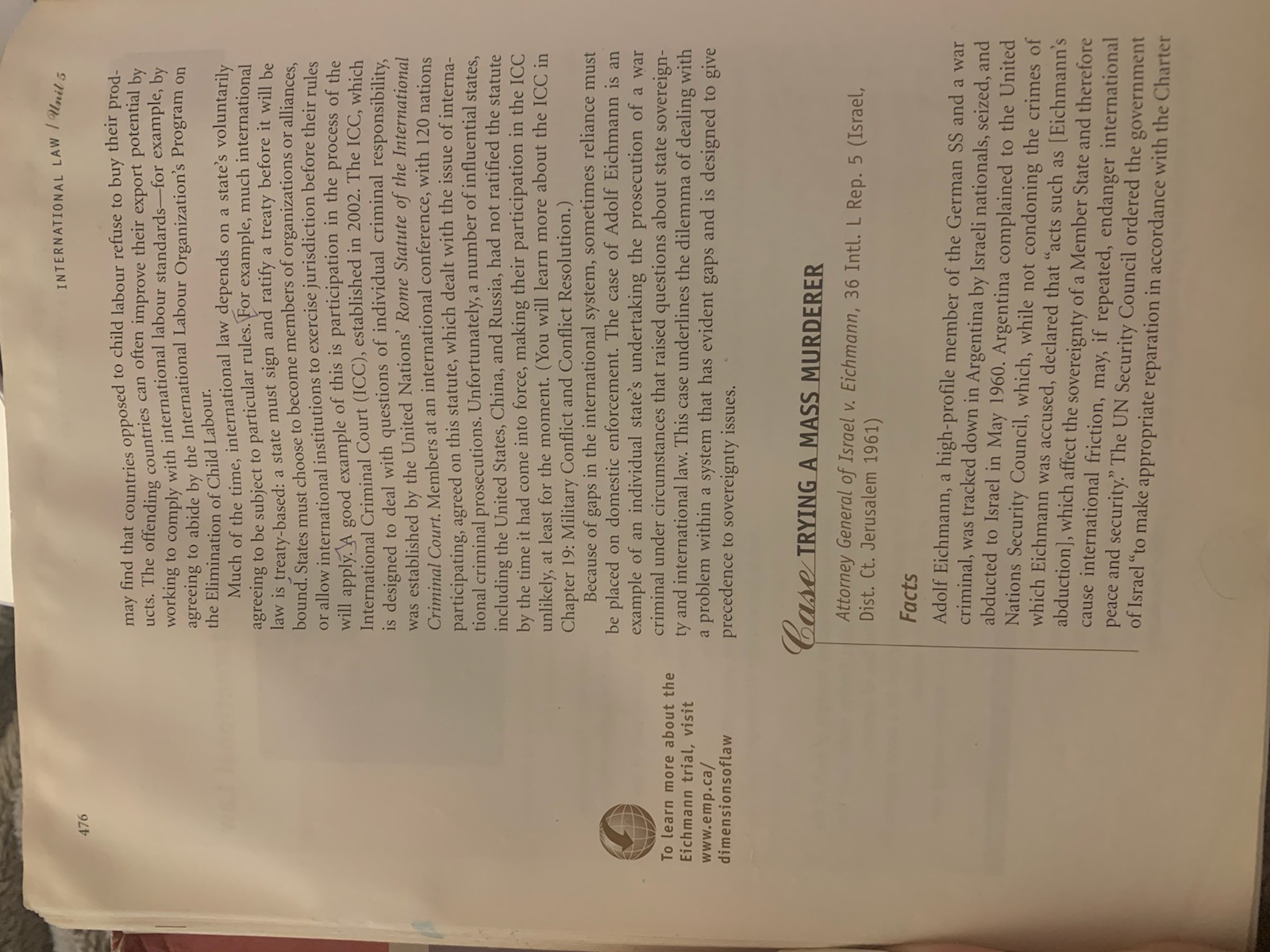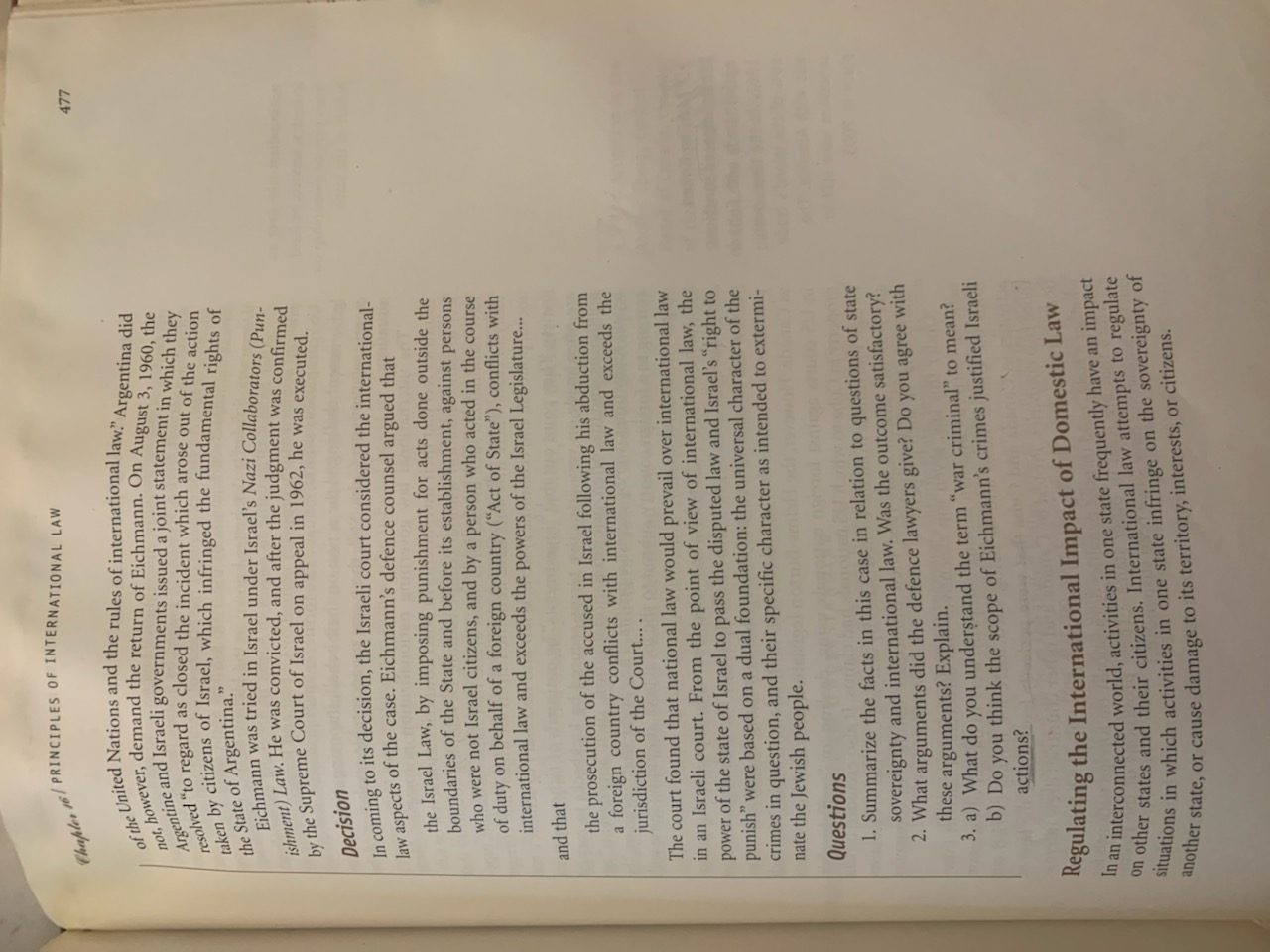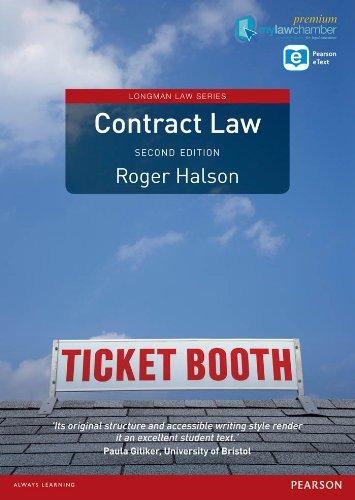Instructions: Use your textbook to read the case and then answer the questions below.
INTERNATIONAL LAW Units 476 may find that countries opposed to child labour refuse to buy their prod ucts. The offending countries can often improve their export potential by king to comply with internation ternational labour standards-for example, by agreeing to abide by the International ernational Labour Organization's Program on the Elimination of Child Labour. Much of the time, international law depends on a state's voluntarily agreeing to be subject to particular rules. For example, much international law is treaty-based: a state must sign and ratify a treaty before it will be bound. States must choose to become members of organizations or alliances, or allow international institutions to exercise jurisdiction before their rules will apply. A good example of this is participation in the process of the International Criminal Court (ICC), established in 2002. The ICC, which is designed to deal with questions of individual criminal responsibility, was established by the United Nations' Rome Statute of the International Criminal Court. Members at an international conference, with 120 nations participating, agreed on this statute, which dealt with the issue of interna- tional criminal prosecutions. Unfortunately, a number of influential states, including the United States, China, and Russia, had not ratified the statute by the time it had come into force, making their participation in the ICC unlikely, at least for the moment. (You will learn more about the ICC in Chapter 19: Military Conflict and Conflict Resolution.) Because of gaps in the international system, sometimes reliance must be placed on domestic enforcement. The case of Adolf Eichmann is an example of an individual state's undertaking the prosecution of a war To learn more about the criminal under circumstances that raised questions about state sovereign- Eichmann trial, visit ty and international law. This case underlines the dilemma of dealing with www.emp.ca/ a problem within a system that has evident gaps and is designed to give dimensionsoflaw precedence to sovereignty issues. Case TRYING A MASS MURDERER Attorney General of Israel v. Eichmann, 36 Intl. L Rep. 5 (Israel, Dist. Ct. Jerusalem 1961) Facts Adolf Eichmann, a high-profile member of the German SS and a war criminal, was tracked down in Argentina by Israeli nationals, seized, and abducted to Israel in May 1960. Argentina complained to the United Nations Security Council, which, while not condoning the crimes of which Eichmann was accused, declared that "acts such as [ Eichmann's abduction], which affect the sovereignty of a Member State and therefore cause international friction, may, if repeated, endanger international peace and security." The UN Security Council ordered the government of Israel "to make appropriate reparation in accordance with the CharterChapter 16/ PRINCIPLES OF INTERNATIONAL LAW 477 of the United Nations and the rules of international law." Argentina did not, however, demand the return of Eichmann. On August 3, 1960, the Argentine and Israeli governments issued a joint statement in which they resolved "to regard as closed the incident which which arose out of the action taken by citizens of Israel, which infringed the fundamental rights of the State of Argentina." Eichmann was tried in Israel under Israel's Nazi Collaborators (Pun- ishment) Law. He was convicted, and after the judgment was confirmed by the Supreme Court of Israel on appeal in 1962, he was executed. Decision In coming to its decision, the Israeli court considered the international- law aspects of the case. Eichmann's defence counsel argued that the Israel Law, by imposing punishment for acts done outside the boundaries of the State and before its establishment, against persons who were not Israel citizens, and by a person who acted in the course of duty on behalf of a foreign country ("Act of State"), conflicts with international law and exceeds the powers of the Israel Legislature. and that the prosecution of the accused in Israel following his abduction from a foreign country conflicts with international law and exceeds the jurisdiction of the Court... . The court found that national law would prevail over international law in an Israeli court. From the point of view of international law, the power of the state of Israel to pass the disputed law and Israel's "right to punish" were based on a dual foundation: the universal character of the crimes in question, and their specific character as intended to extermi- nate the Jewish people. Questions 1. Summarize the facts in this case in relation to questions of state sovereignty and international law. Was the outcome satisfactory? 2. What arguments did the defence lawyers give? Do you agree with these arguments? Explain. 3. a) What do you understand the term "war criminal" to mean? b) Do you think the scope of Eichmann's crimes justified Israeli actions? Regulating the International Impact of Domestic Law In an interconnected world, activities in one state frequently have an impact on other states and their citizens. International law attempts to regulate situations in which activities in one state infringe on the sovereignty of another state, or cause damage to its territory, interests, or citizens








